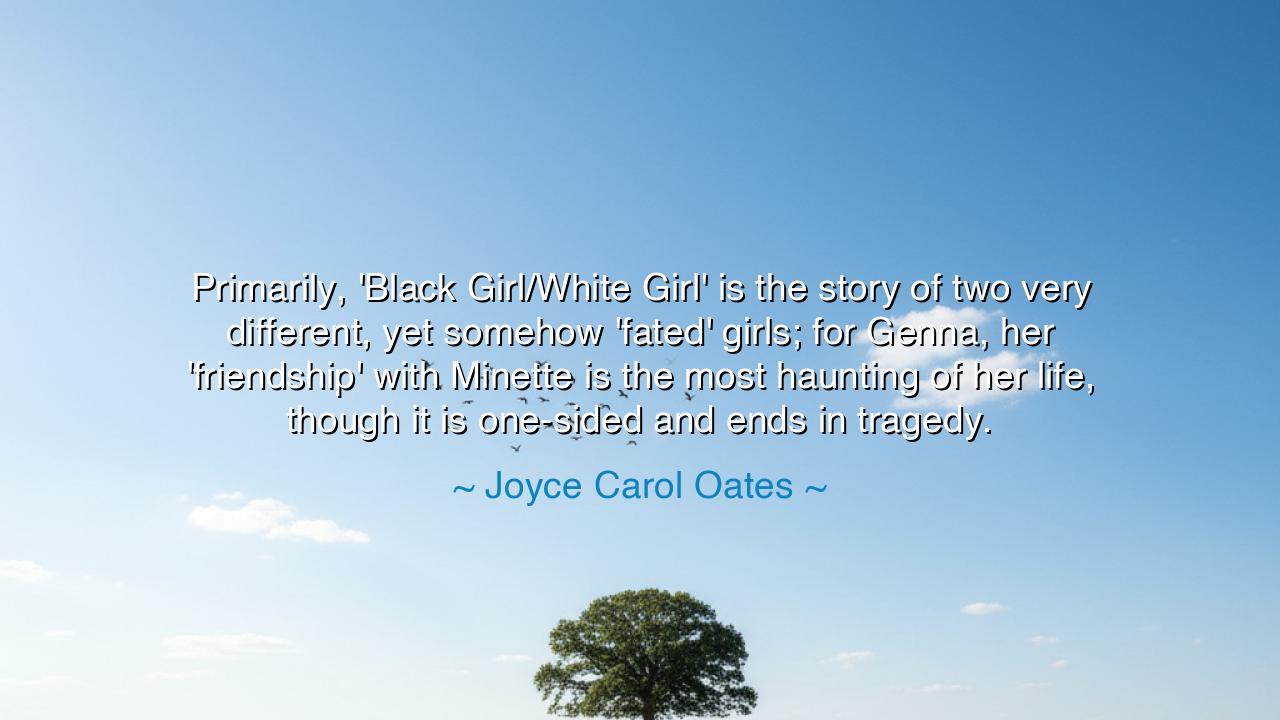
Primarily, 'Black Girl/White Girl' is the story of two very
Primarily, 'Black Girl/White Girl' is the story of two very different, yet somehow 'fated' girls; for Genna, her 'friendship' with Minette is the most haunting of her life, though it is one-sided and ends in tragedy.






In the grand stories of the ancients, we often find that the most poignant relationships are those that are marked not by ease or harmony, but by the stark contrast between the souls involved. Joyce Carol Oates speaks of such a bond in her reflection on Black Girl/White Girl, saying: “Primarily, 'Black Girl/White Girl' is the story of two very different, yet somehow 'fated' girls; for Genna, her 'friendship' with Minette is the most haunting of her life, though it is one-sided and ends in tragedy.” These words echo the timeless truth that some of the most profound connections we form are those that are fraught with difficulty, misunderstanding, and, ultimately, loss. Friendship, in its most complex form, does not always deliver happiness, but often leaves us with something deeper: a lesson on the nature of connection, identity, and the pain of unreciprocated love.
The ancients understood the tragic beauty of relationships that are unbalanced—the bond between Achilles and Patroclus, for instance, is one such relationship that transcends mere friendship. Their connection was born from a shared struggle, yet it was marked by an inherent imbalance—Achilles, the hero, and Patroclus, the loyal companion. Their bond, though powerful, ended in tragedy when Patroclus died in battle, leading Achilles to avenge him with fury. The relationship between Genna and Minette in Oates' tale mirrors this in its tragic imbalance. It is a one-sided connection, where one person clings to the bond with all their heart, while the other remains unaware or indifferent to the depth of the other’s feelings. This unreciprocated friendship leaves Genna haunted, just as Achilles was left broken by the death of Patroclus.
Consider the ancient story of Orpheus and Eurydice, whose love was tragically interrupted by death. Orpheus, in his grief, journeyed into the Underworld to bring back his wife, but because of his failure to trust the conditions of their return, he lost her forever. This one-sided love consumed Orpheus, just as Genna's fixation on Minette consumes her. Orpheus loved with such intensity that the loss of Eurydice left him unable to see the world in the same way. Likewise, Genna, who holds onto a friendship that was never truly shared, becomes trapped in the haunting memory of what could have been. Oates’ story is a reflection of human nature—how sometimes we invest ourselves in relationships that, despite our best efforts, are fated to end in tragedy.
The lesson here is not just about the pain of unreciprocated love, but the nature of friendship itself. Friendship is often idealized in stories and in our hearts, but in the reality of life, it is not always the perfect union of two souls. Sometimes, it is messy, uneven, and even painful. Just as Genna and Minette’s bond is marked by imbalance and tragic loss, we must understand that not every connection we form will be returned in the way we hope. The depth of our feelings may not always be shared, and this can leave us feeling haunted or incomplete. However, this is a reminder that even in tragedy, there is growth, and even in loss, there is wisdom.
The ancient Greeks taught that tragedy is often the path to wisdom. The Odyssey, the great journey of Odysseus, is filled with loss, separation, and pain, but it is also about learning and growing through these hardships. The relationship between Genna and Minette may not have provided the closure that Genna sought, but it imparted a deep understanding of self and the complexities of human connection. Sometimes, it is the very relationships that challenge us most that shape us, that make us understand who we are and what we are capable of.
In our own lives, we must recognize that friendships—and all relationships—will not always follow the script we desire. Some bonds will be reciprocal, while others will leave us with more questions than answers. However, Oates’ reflection reminds us that tragedy is not the end of the story, but rather a moment of transformation. We are often most profoundly shaped by the losses we experience and the relationships that test us. Like Genna, we must learn to embrace these painful moments as part of our journey and as teachers of the deeper truths about ourselves.
Thus, let us take the wisdom of Oates and the ancients to heart. Let us understand that friendship is not always a path of harmony, but one that can be fraught with pain, misunderstanding, and loss. Yet, in this very pain, we find the seeds of growth, and in the broken friendships of our lives, we may uncover the most important lessons. It is through these trials that we come to understand not only others but also ourselves. And as we move forward, we must carry the understanding that even unreciprocated bonds are not in vain—they shape us, strengthen us, and help us grow into the people we are meant to be.






AAdministratorAdministrator
Welcome, honored guests. Please leave a comment, we will respond soon